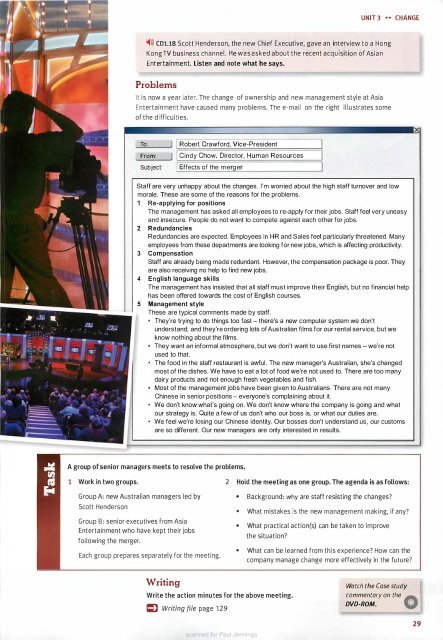Market Leader Intermediate 3rd edition SB
Create successful ePaper yourself
Turn your PDF publications into a flip-book with our unique Google optimized e-Paper software.
UNIT3 •• CHANGE<br />
$ C01.18 Scott Henderson, the new Chief Executive, gave an interview to a Hong<br />
Kong TV business channel. He was asked about the recent acquisition of Asian<br />
Entertainment. Listen and note what he says.<br />
Problems<br />
It is now a year later. The change of ownership and new management style at Asia<br />
Entertainment have caused many problems. The e·mail on the right illustrates some<br />
of the difficulties.<br />
To :<br />
From:<br />
Subject:<br />
I I Robert Crawford, Vice-President<br />
I I Cindy Chow, Director, Human Resources<br />
I Effects of the merger<br />
Staff are very unhappy about the changes. I'm worried about the high staff turnover and low<br />
morale. These are some of the reasons for the problems.<br />
1 Re-applying for positions<br />
The management has asked all employees to re-apply for their jobs. Staff feel very uneasy<br />
and insecure. People do not want to compete against each other for jobs.<br />
2 Redundancies<br />
Redundancies are expected. Employees in HR and Sales feel particularly threatened. Many<br />
employees from these departments are looking for new jobs, which is affecting productivity.<br />
3 Compensation<br />
Staff are already being made redundant. However, the compensation package is poor. They<br />
are also receiving no help to find new jobs.<br />
4 English language skills<br />
The management has insisted that all staff must improve their English, but no financial help<br />
has been offered towards the cost of English courses.<br />
5 Management style<br />
These are typical comments made by staff.<br />
They're trying to do things too fast - there's a new computer system we don't<br />
understand; and they're ordering lots of Australian films for our rental service, but we<br />
know nothing about the films.<br />
They want an informal atmosphere, but we don't want to use first names - we're not<br />
used to that.<br />
The food in the staff restaurant is awful. The new manager's Australian, she's changed<br />
most of the dishes. We have to eat a lot of food we're not used to. There are too many<br />
dairy products and not enough fresh vegetables and fish.<br />
Most of the management jobs have been given to Australians. There are not many<br />
Chinese in senior positions - everyone's complaining about it.<br />
We don't know what's going on. We don't know where the company is going and what<br />
our strategy is. Quite a few of us don't who our boss is, or what our duties are.<br />
We feel we're lOSing our Chinese identity. Our bosses don't understand us, our customs<br />
are so different. Our new managers are only interested in results.<br />
A group of senior managers meets to resolve the problems.<br />
1 Work in two groups.<br />
Group A: new Australian managers led by<br />
Scott Henderson<br />
Group B: senior executives from Asia<br />
Entertainment who have kept their jobs<br />
following the merger.<br />
Each group prepares separately for the meeting.<br />
2 Hold the meeting as one group. The agenda is as follows:<br />
• Background: why are staff resisting the changes?<br />
•<br />
What mistakes is the new management making, if any?<br />
• What practical action(s) can be taken to improve<br />
the situation?<br />
• What can be learned from this experience? How can the<br />
company manage change more effectively in the future?<br />
Writing<br />
Write the action minutes for the above meeting.<br />
Writing file page 129<br />
scanned for Paul Jennings<br />
Watch the Case study<br />
commentary on the <br />
OVO-ROM.<br />
W<br />
29


